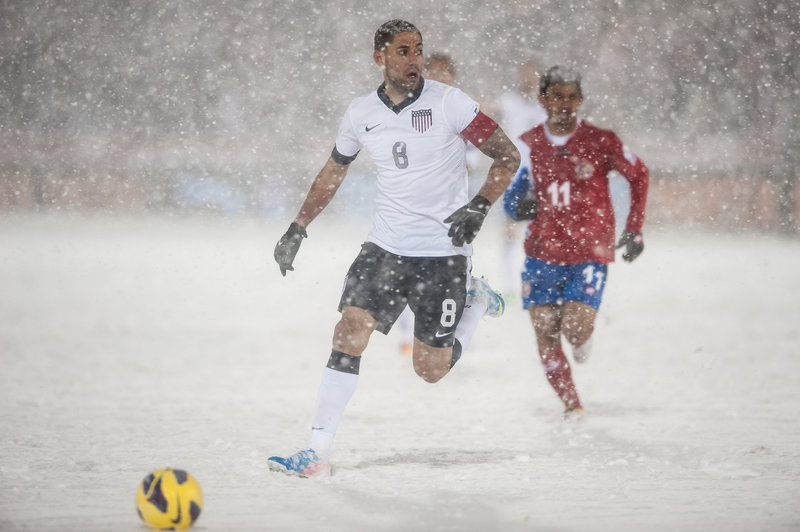

School of sport with TIM MIDDLETON
SOMEONE once said that at “40 degrees, Californians shiver uncontrollably, but people in Scotland sunbathe. At 20C degrees, people in Florida wear coats and wool hats while people in Scotland wear shorts and a T-shirt.
At 0 degrees, New York landlords turn the heat on, but people in Scotland have a braai. At -20 degrees, Californians move to Mexico while people in Scotland throw on a light jacket. At -80 degrees, polar bears begin to evacuate the Arctic, but Scottish Boy Scouts postpone their winter survival exercise until it gets cold enough. At minus 173F degrees, Ethyl alcohol freezes, but people in Scotland get angry because they cannot thaw their whisky. At minus 460 degrees, all atomic motion stops and people in Scotland start saying ‘It’s a bit hill-billy.’ At minus 500 degrees, Hell freezes over and only then do Scottish people support England in the soccer World Cup!”
If we look at sport in such terms, at what temperature are we running our sport? Where might sport fit on our thermometer? At the lowest, coolest level, it may be best defined simply as knowledge. We know about sport; we know what constitutes sport; we know what different sports are. We would not play it or watch it, though. The next step up the ladder of the sporting thermometer is Interest. We do not just know about sport, but we want to know more and like to read about it; we are happy to watch it, if invited, but would not go out of our way to see it. We do not play it.
When the temperature of sport gets hotter we reach the level of Fascination. We do not just watch it, but ask questions about it; we follow it with more interest; we are intrigued by tactics and skills. We only play it, though, if forced. From there the level heats up to the point of Relaxation; we do not just enjoy watching and reading about it, but now we enjoy playing it and find great comfort, energy and benefit in it. As that heats up further, so our participation leads on to Enthusiasm. We do not just enjoy kicking a ball around, but now we train, practise, compete each week. We look forward to the practices and are happy to volunteer for more. We even go on the internet to learn more.
Gradually, in time, that enthusiasm can develop into Passion. No longer do we like sport; now we love it. We have to play it, daily, measuring and recording our progress. Our every conversation is about it. We love it! We train hard, dedicated, determined, desperate for more and for improvement. As that passion increases in intensity, soon sport can become an Obsession. Our every waking moment is committed to it. We travel hundreds of kilometres to watch it and play it; we research every minute detail about opponents and previous events, analysing performances and tactics. We buy all the new team kit as soon as it comes out. We have to have sport, lots of it!
Then, finally, as the thermometer hits the top, sport has become a Religion. We live and die by it, swear on it, fight in it, follow it completely. Our lives are altars to our sport. We sing songs in praise of our team, we raise our hands and bow down before players, we fellowship with like-minded sportsmen, we study it in our spare time and our moods are dependent on results. Our school life is dictated by our sport; our school is defined by our victories more than our values. We worship it.
- Chamisa under fire over US$120K donation
- Mavhunga puts DeMbare into Chibuku quarterfinals
- Pension funds bet on Cabora Bassa oilfields
- Councils defy govt fire tender directive
Keep Reading
Sport and spirituality can go together. We will find many Biblical references to sport, many spiritual lessons, many practical reflections. Sport can bring some hope, comfort, meaning, enjoyment, but it will not bring meaning to life. Sadly, sport has become an idol for many in this country. Furthermore, sport is important, for sure – that is why we insist on doing it at school. The question, though, is: where on the thermometer does it lie for us as an individual and for us as a school? Is it at the level of Knowledge, Interest, Fascination, Relaxation, Enthusiasm, Passion, Obsession or Religion? We must not allow it to become a religion.
The following quote perhaps articulates best the balance that is necessary: “My philosophy is to ensure players feel more amateur than professional; the more important something gets, the harder it is to do well. Sport matters too much and the mattering gets in the way”. Do we know who said that? It was not some sport-hating nerd who has done nothing in sport in their life, nor was it a vest-clad sweating Scotsman; it was none other than the 2002 World Cup-winning soccer coach, Luiz Felipe Scolari. Turn the air conditioning down and pay heed to this. Sport is not a religion.
Tim Middleton is a former international hockey player and headmaster, currently serving as the executive director of the Association of Trust Schools. Email: [email protected]











